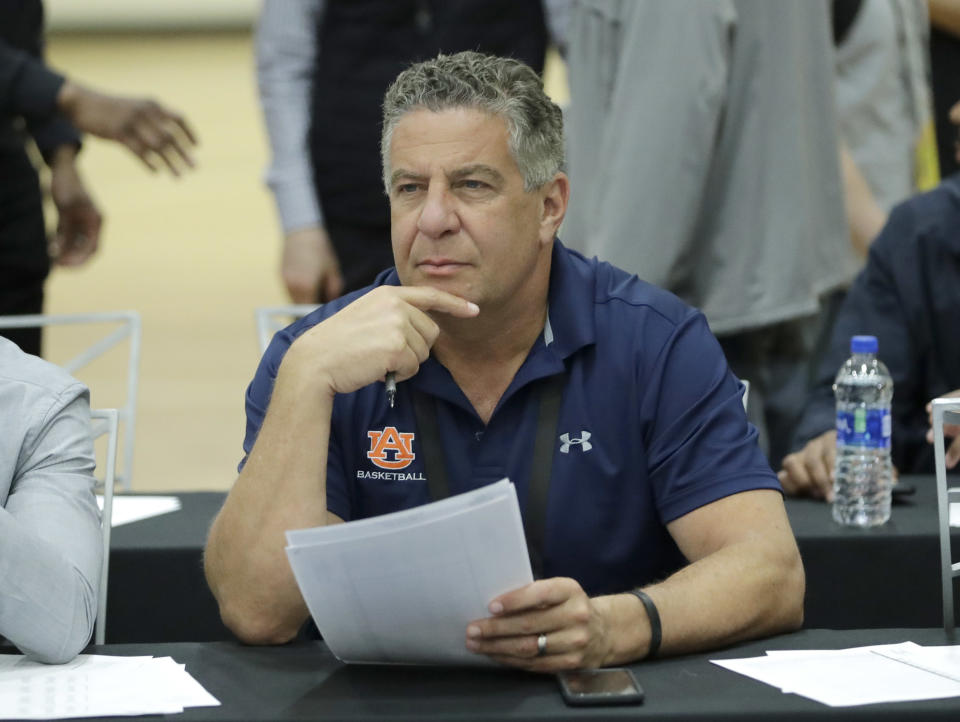Bruce Pearl's extension is further proof the FBI probe hasn't changed college basketball

Unscrupulous agents. Shady AAU coaches. Warring shoe-apparel giants. Money-hungry parents. Win-at-all-costs college coaches.
Plenty of familiar villains have played a role in college basketball’s descent into lawlessness and corruption, but there’s one group that too often escapes blame for its role in cultivating the sport’s shadowy underworld. It’s the hypocritical university presidents, many of whom are quick to preach integrity and slam their fists in righteous indignation at the first whiff of scandal elsewhere yet are slow to act when doing what’s right comes at the expense of their own school’s profits or win-loss record.
Too often they sign off on hiring coaches with tarnished histories but winning track records. Too often they make excuses for successful coaches whose programs are caught breaking the rules.
The latest example arrived Monday when Auburn announced it had extended the contract of basketball coach Bruce Pearl through the 2022-23 season. That’s the same Bruce Pearl who received a show-cause penalty at Tennessee for committing recruiting violations and lying to NCAA investigators about them. And the same Bruce Pearl whose Auburn program is embroiled in a federal investigation that has ensnared at least nine other high-profile college basketball programs across the nation.
Assistant coach Chuck Person was fired last year after being charged with accepting $90,000 in bribes in return for steering Auburn players to a financial adviser and an Atlanta clothier. The fallout also ensnared Auburn starters Austin Wiley and Danjel Purifoy, both of whom were ruled ineligible to play last season by the NCAA.
When Pearl declined to speak with with the law firm Auburn hired to conduct its internal investigation into his program last fall, ESPN reported that university officials had advised him his job would be in jeopardy if he continued not to cooperate. Only seven months later, Pearl has a contract extension and Auburn appears poised to stand by him barring new information emerging.
Yahoo Sports reached out to Auburn on Monday seeking comment from university president Dr. Steven Leath on why he felt a contract extension for Pearl was appropriate. Since Auburn did not immediately respond to that request, we are left with two potential explanations for why Pearl has been rewarded even as the specter of the FBI investigation casts a shadow over his success.
One possible reason is that Auburn has uncovered undisclosed evidence that suggests Pearl was unaware of Person’s alleged conduct and had nothing to do with it. The other is that Auburn is more willing to extend the benefit of the doubt to Pearl now that his program is winning.
Pearl is just over two months removed from a breakthrough season during which Auburn won 26 games and captured a share of the SEC title. What’s more, the Tigers could crack the top 10 of the 2018-19 preseason AP Top 25 with six of their top eight scorers poised to return and Wiley and Purifoy set to regain their eligibility.
In its release announcing Pearl’s extension, Auburn made no mention of the FBI investigation hovering over the program. Athletic director Allen Greene instead lauded Pearl for engineering “a historic season for Auburn basketball and one that was matched by excellence in the classroom as well.”
Auburn is far from the only program that has conducted business as though it’s seemingly unfazed by the federal investigation into college basketball.
Cal State Northridge brazenly hired ex-North Carolina State coach Mark Gottfried in late March soon after his former program landed in the crosshairs of federal investigators. In February, Yahoo Sports published documents alleging that one of Gottfried’s former star players, Dennis Smith Jr., received a $73,500 loan from an agent that would have compromised his eligibility. A few weeks later, the Washington Post reported NC State had received a federal grand jury subpoena.
While Louisville fired legendary coach Rick Pitino soon after the federal investigation went public in late September, none of the other schools implicated have followed suit. Arizona has defended Sean Miller, as has USC with Andy Enfield and Oklahoma State with Mike Boynton.
The message to coaches from all this isn’t hard to detect. Colorado coach Tad Boyle articulated it perfectly in an interview with Yahoo Sports last October.
“When you see coaches who have been fired for breaking NCAA rules and then rehired elsewhere, that sends a message loud and clear to coaches,” Boyle said. “If you win and you get caught cheating, there’s another chance down the road. If you lose and you’re clean on the other hand, you may not be hired again.”
Pearl’s contract extension on Monday is the strongest evidence yet of Boyle’s point.
For all the talk about the FBI investigation inspiring meaningful change in college basketball, it hasn’t happened yet. And it won’t unless the university presidents stop merely saying the right things and start following through.
– – – – – – –
Jeff Eisenberg is a college basketball writer for Yahoo Sports. Have a tip? Email him at daggerblog@yahoo.com or follow him on Twitter!
More from Yahoo Sports:
• Cavs star abruptly ends interview: ‘That’s [expletive] up’
• In classy move, Bears sign TE after catastrophic injury
• Coach Kerr trolls LeBron at news conference
• GM VP’s pace car humiliation in Detroit



